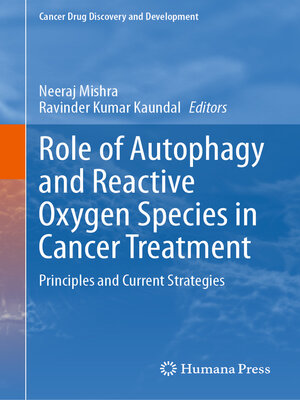Role of Autophagy and Reactive Oxygen Species in Cancer Treatment
ebook ∣ Principles and Current Strategies · Cancer Drug Discovery and Development
By Neeraj Mishra

Sign up to save your library
With an OverDrive account, you can save your favorite libraries for at-a-glance information about availability. Find out more about OverDrive accounts.
Find this title in Libby, the library reading app by OverDrive.



Search for a digital library with this title
Title found at these libraries:
| Library Name | Distance |
|---|---|
| Loading... |
Autophagy is a catabolic process that eliminates damaged and faulty cellular components via lysosomes. It responds to adverse circumstances like nutritional deficiency, hypoxia, and oxidative damage. Reactive oxygen species (ROS) cause oxidative stress, which is a multidimensional chemical that drives various pathophysiological diseases, including cancer. In addition, the autophagy process has a double role, first preventing tumour formation, but later fostering tumour progression. A growing body of research suggests that autophagy and ROS have a complex interplay in which they can either prevent cancer growth or enhance disease genesis. While a combination of autophagy inhibitor and cytotoxic medicines is now being used in cancer treatment, investigating the potential of autophagy inhibitors for overcoming resistance to different anticancer medications and how this relates to the control of cancer micro environmental stressors raises several questions. Autophagy's dual functions as a safeguarding and cytotoxic process have drawn attention to its significance in the development of cancer.







